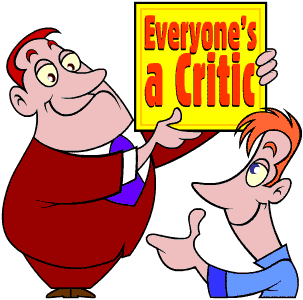 |
|
||||||||||||
|
Columns by Nancy K. Austin: Everyone's a Critic... Even You
List all of Nancy's columns
Visit our other Getting Work Columnist
|
Years ago, a business veteran told me something I'll always remember: Moderation, he said, kills creativity. People only accomplish great things when they're royally cheesed off or on fire with a cause. There's nothing -- zippo, zero, nada -- in between. Which means if you want to get anything done, let alone build up your professional reputation and add to your client list, you've got to give a fantastic flying fig about the work you do -- or you're doomed, because lukewarm does not hack it. I just had a close-up look at this principle in action. My sister, Melanie, a licensed drug and alcohol counselor, was telling me how she won her current gig. It started when she got into a beef over the way public-school funding was allocated in her home state of Washington. Melanie's the parent of a smart kid who needs some extra help (speech therapy, for instance). At a public meeting to talk about how special-ed moneys would be spent in her district, another parent argued that those funds should be dedicated exclusively to training all teachers to work with autistic children. A crashing debate broke out, and words heated up the room as one side pushed for their pet project, while the other (which included my sister) urged that the funds be spread around, since there were students in the district with all kinds of special needs. By the time the hollering was done, Melanie was so steamed that she went home and wrote a direct, cogent -- and, above all, passionate -- letter to the school board. She sent a copy to the local newspaper, which printed it. The response, as you might guess, was huge. Among those who got in touch with my sister was the superintendent of the school district; he let Melanie know he was so impressed by her fire and focus that he would mow down practically any obstacle to get her to work for the district. Although it was the last thing she intended when she wrote it, her letter, pulsing with passion, turned out to be a matchless marketing tool. Yes, your bête-noire can feed self-promotion, but a few caveats are in order. Don't get your knickers in a knot. Had my sister behaved like a bratty two-year old at the budget conference and let fly with a sudden, violent burst of ill temper, she would have been hoo-hahed out of there. Instead, Melanie made up her mind to fight for her daughter's education, without going postal. She saw an opportunity to act and capitalized on it by speaking up at the meeting and writing her letter -- simple, direct, controlled. What she demonstrated, in a word, is backbone -- a potent mix of flinty determination, self-respect, and strength of character that belongs to people who get things done. To understand backbone, a good place to start is with Susan Marshall's aptly titled How to Grow a Backbone. IPs will have to mentally translate the book's many boss-worker examples into boss-free scenarios, but the author's advice is dependable and it holds word-for-word. Backbone, Marshall says, has three components: competence, confidence, and risk-taking. To grow your own backbone, you have to know a thing or two about what you're talking about, possess the kind of self-assurance that comes from accomplishing things, and work up the gumption to act boldly and intelligently. Put it all together, Marshall says, and you're well on your way to wielding power and influence. "Why be a plow horse," she asks, "when you can be a unicorn?" You gotta wanna. A few years ago, IP Emily Rubin was getting ready to start teaching "Futures for Young Parents," one of a galaxy of programs that help prepare people for the GED (General Education Development) Test. Rubin's program was designed especially for pregnant and parenting teens. Right away, she realized that the course materials, supplied by Public/Private Ventures, a Philadelphia-based nonprofit that specializes in curriculums for at-risk adolescents, would need extensive reworking. "Because I'm such a nerd," Rubin says cheerily, "I got really excited about making the changes, since I'd never found curriculum that fit pregnant, urban teens." Here was her chance, she believed, to produce the very best product for these young women. "For the good of humanity, really, I thought it would be great." As Rubin tweaked and transformed the core curriculum, she sent to Public/Private Ventures copies of her revisions, along with descriptions of what worked especially well in the field (a.k.a., the real world). In essence, she became a one-woman beta test site for PPV. "They appreciated what I did, and I stayed in touch with them," Rubin says. "There was no money involved; I just felt a connection with these people." Years later, out of the blue, PPV called Rubin to ask her to revise the whole enchilada, all 14 chapters of the curriculum, a project that would take almost a year. This time, they'd even pay her. "It wasn't part of my agenda to get a job with them," she points out. "That was the farthest thing from my mind! I was just really excited about it. And I still work for them as a freelancer." Plenty of people know their way around curriculum design, but what set Rubin apart from the crowd is a marrow-level desire to produce the best program she could imagine. Rubin's goal was bigger than money. That's what guided her work and kept her going -- not some Machiavellian plot to land a fat contract. Tell it like it is. If you've ever signed up for an interpersonal skills workshop, you might have bumped into a sneaky communication trick known as The Sandwich. When you have negative feedback to deliver, this theory goes, you should start off and shut down the conversation with positive comments, and shove your criticism in the middle, like tuna on toast or ham on rye. Well, it sounds delicious, but it never turns out that way. Never. The thing about negative feedback is that a spoonful of sugar won't help this medicine go down -- it makes everything worse. We've all been marooned here, bracing for the "but" that we know is coming. "Oh, Louis, your logo design is too, too brilliant! You're so creative, marching to your own drummer. But you hacked off our CEO when you said he had all the imagination of a mealworm. Now he thinks you're a jerk. You're out of here, buddy. Great work, though. Really." What most people don't realize is that padding bad news with cottony-soft compliments accomplishes exactly nothing, except to show that you're not so hot at handling the rough stuff (like serious thinking) and perhaps shouldn't be entrusted with too much responsibility. When Emily Rubin delivered her feedback about the weaknesses of the curriculum to its designers, she wasn't seduced by the Sandwich Theory. Instead, she pulled no punches and got her message across directly and honestly, a decision that only boosted her credibility in the eyes of her future client. You might even say that she gave it the best she had, and eventually, the best came back to her. The story's the same with my sister, who had something to say and said it, without trying to hedge her bets in a misguided attempt to bliss out the opposition before she lowered the boom. Do your homework. Personally, I'm a pushover for the classic, well-informed argument. If you ask me, there's nothing more persuasive than a point of view that's grounded in real, solid, critical thought. So unless you've prepped and prepared like a college freshman pulling his first all-nighter before final exams, you haven't done enough. Look long and hard at every angle before you take a dramatic stand. Like Emily Rubin -- who put an entire curriculum to a rigorous hands-on test and reported in detail on the results -- you need hard data to back up your claims and conclusions. Otherwise, your opinion will be tossed aside faster than you can say dilettante. Don't mistake sparks for substance, or you'll get burned. The great thing about learning to deliver feedback with impact is that it's one of the most versatile skills you can acquire. It works at dinner parties, business meetings, heated debates, formal presentations, sales calls, and impromptu get-togethers. A strong point of view backed up by rock-solid thinking is practically irresistible. Which is the whole idea, right? |
|
|
We'd love to hear your feedback about this column, or put you in touch with Nancy K. Austin if you like. You may also like to see her biography. |
The 1099 name and logo are trademarks of 1099 Magazine.

